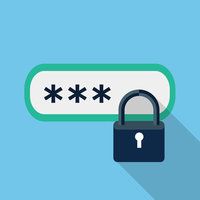Password Protection Is the Key to Online Security
One little alphanumeric phrase -- your password -- is the only thing keeping your financial data safe. Follow these tips to bolster your defenses.

For investors, the use of electronic financial tools continues to change the way we save and invest. While the advantages are many, there are some obvious challenges, too, including the possibility of identity theft, direct theft of money or goods, phishing scams, and electronic spam. Over three parts, we’ll look at ways to protect yourself, starting today with the most important aspect of online protection: good password protection and safety.
Passwords are like an online house key; they must be kept secure at all times. They should also be changed fairly frequently. If you’re like me, you’ve got a dozen or more different log-ins and passwords for a dozen different websites and online accounts. Keeping track of them, and keeping them safe, can be a challenge, but this endeavor should be treated with the same seriousness you apply to not sharing a key to your home.
Creating a Good Password
Strong passwords contain a mix of numbers, letters (ideally both upper and lower-case), and, if a site accepts them, symbols. Your passwords should have personal relevance so that they’re easy for you to remember, but not too much! Your date of birth is available to hundreds if not thousands of people, as is your home address, and the address of your physician practice. Your pet’s name is probably available through publicly available spaces such as Snapchat or Facebook.
Keeping Your Password Close
Sharing is great…if it’s a pitcher of lemonade or a bucket of movie theater popcorn. Sharing your passwords is a recipe for trouble. If you share accounts with your spouse, make sure both of you practice good password security. A reputable retailer or financial organization will never ask for your log-in or password over an email, neither to verify the account status or for any other reason. Online scams can be sophisticated, however. Some even include a link that takes you to a site designed to look like a reputable site, such as eBay. Use extra caution when clicking on any email link, even if it looks legitimate.
Some digital security experts recommend writing your passwords down and keeping tight watch over that sheet of paper. This is risky, too, but it may be necessary to keep up with all your different passwords. Why? Because it’s a very bad idea to keep your log-in and password the same for every single site. If discovered, nefarious operators will now have access to everything. If you do write all your passwords down, don’t leave that sheet near your computer or under your mouse pad. Really…don’t do this.
Managing Your Security
Although it will involve adding some extra steps every time you log in, take advantage of any additional authentication steps an e-commerce site may have. These may include a second password, security questions, voice recognition, or some real spy stuff, like finger-scanning and iris scanning, among many others. Any of these will add an important layer of security you may be thankful for later.
A Final Word
Good password security can involve online service, secure password generators, and eye scanners. But it doesn’t have to. Following the steps outlined above will protect you from the vast majority of online financial breaches.
ACTIVA BioACTIVE Bulk Flow Marks Pulpdent’s First Major Product Release in 4 Years
December 12th 2024Next-generation bulk-fill dental restorative raises the standard of care for bulk-fill procedures by providing natural remineralization support, while also overcoming current bulk-fill limitations.